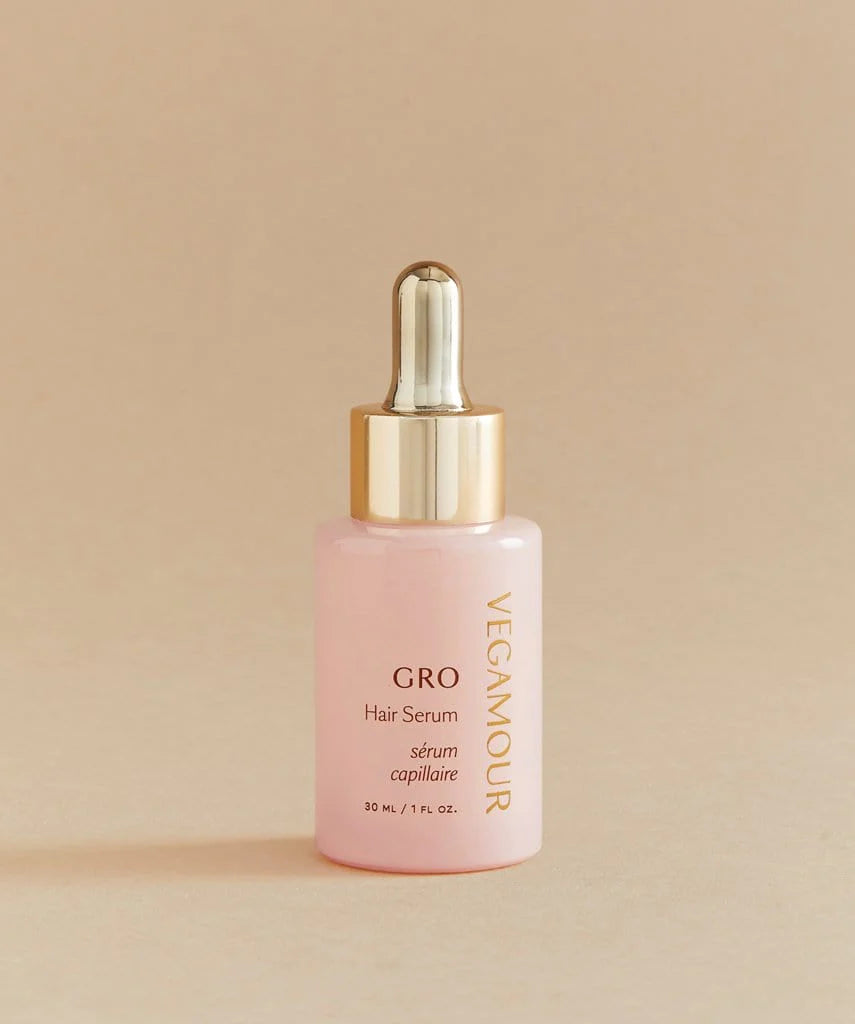As embarrassing and uncomfortable as they can sometimes be, itching and scratching are part of being a human. But when excessive scratching hits, especially around the scalp, will it trigger hair thinning and even permanent hair loss?
To untangle the link between scalp inflammation and potential hair loss, VEGAMOUR spoke to an expert and examined the research. Keep reading for the answers — plus, find out what all-natural, vegan hair products you should use to promote scalp health.
How to Recognize Scalp Inflammation
Scalp pruritus, or an itchy scalp, isn't particularly rare, and it's not always something to worry about. Sometimes all you need to soothe an itchy scalp is a sulfate-free shampoo and conditioner and a looser hairstyle. But if you're starting to notice skin irritation and experience a variety of symptoms, is your hairline going to suffer too?
Dr. Emmanuel Loucas, Director of SINY in New York and assistant professor of dermatology at Mount Sinai hospital New York told VEGAMOUR, "Scalp inflammation is a common problem that I see in my office on a regular basis. People usually present with one or several of the following symptoms or complaints: scalp redness, flaking, bumps, tenderness, pain, hair shedding and/or itching.
"The most common and least serious (cause of scalp inflammation) is dryness of the scalp most often seen in dry, cold weather and in those people who tend to use many hair products and shampoo one to two times a day."
Other common symptoms of scalp inflammation can also include:
- Scaly patches
- Dandruff
- Flaking skin
- Bald patches
- Redness
- Oily buildup
- Burning sensation
In some cases, scalp itchiness can be a sign of underlying health conditions that can result in hair loss.
"Most of the time, the hair loss is transient, and once you get rid of the inflammation, it will regrow, with the exception of some less common medical conditions such as lupus and conditions that cause scarring alopecia (hair loss)," said Dr. Loucas.
Shop: Jaclyn Gibson's Top VEGAMOUR Picks
Common Causes of Scalp Inflammation
Scalp inflammation can be triggered by any of the following conditions.
Scalp Ringworm (Tinea Capitis)
Scalp ringworm is a common scalp fungus infection, and symptoms can include scaly skin that's inflamed, sore and red. A scalp ringworm infection can result in bald patches as the infected skin and hair follicles cause the strands to become brittle and break. In very severe cases, pus-filled spots can appear alongside painful swelling. If the skin is broken, you might also be given a dose of antibiotics to treat the fungal infection further.
Also: Why Does My Hair and Scalp Hurt? Doctors Explain
Scalp Yeast Infection
While you might think of yeast infections occurring elsewhere on the body, they can also occur on the scalp. Causes of a scalp yeast infection can include medications, stress or even certain hair products. Symptoms of a yeast infection on the scalp can include itching, inflammation, red patches, white flakes and pus-filled pimples.
Scalp Psoriasis
Psoriasis is a chronic skin condition that can cause itchy skin and encourage thick, silvery patches to grow on the skin. It's also an autoimmune disease that can accelerate cell production, causing them to build up. Symptoms can also include white flakes, soreness and tightness across the skin. It can affect any body area, but the scalp is a common place for the condition to present itself.
Thankfully, many people with scalp psoriasis don't lose their hair, but if excessive scratching results in the raised, inflamed scales of skin ripping away, clumps of hair might be lost simultaneously.
Seborrheic Dermatitis
"Seborrheic dermatitis is the most common medical condition cause (of hair loss) and can overlap with psoriasis. Both can cause inflammation and hair shedding. Thankfully, the hair loss in these conditions is often not permanent and will regrow," explained Dr. Loucas.
Seborrheic dermatitis is a chronic type of eczema that affects areas of the skin (like the scalp) with more oil or sebaceous glands. The excess oil can cause the scalp to become irritated, inflamed and itchy, but once the itching and swelling settle, any lost hair will usually begin to grow back.
Shop: The Best Scalp & Dandruff Products
Alopecia Areata
Alopecia areata is another autoimmune condition that often results in hair loss. According to the Nation Alopecia Areata Foundation, approximately 6.8 million people in the United States and 147 million people worldwide have or will develop this condition at some point in their lives.
With alopecia areata, the hair can fall out in coin-sized patches. And if scarring alopecia occurs, causing the scalp to become more inflamed, the hair follicles can be permanently damaged.
Androgenetic Alopecia
Androgenetic alopecia, also known as female or male pattern baldness, is a genetic disorder that can cause hereditary hair loss — especially male pattern hair loss. It's one of the common scalp disorders that may affect up to 50% of adults. It also can cause the scalp to become inflamed.
Also: What Is Androgenetic Alopecia?
Allergic Reactions
In severe cases, allergic reactions can cause inflammation across the body, including the scalp. As the allergen thrives, the alleged is flushed through the body and is expelled via a physical reaction. If you experience an allergic reaction across your scalp, it could be to an ingredient found in products, hair dyes and even your shampoos. Limit the possibility of allergic reactions by only using all-natural ingredients rather than relying on chemicals and potential toxins.
Scalp Buildup
Buildup on your scalp — natural or product-based — can also trigger inflammation. Dirt, sebum, dead skin cells and sweat are natural forms of scalp buildup that can occur. Product-based scalp buildup can result from silicone-based conditioner, styling gel and talc-based dry shampoo.
How to Treat Scalp Inflammation
The scalp can become inflamed for various reasons. However, if you have troubling symptoms that can severely impact your hair growth, such as open sores or clumps of hair loss, see a medical professional as soon as possible. Otherwise, here are some ways to encourage a healthy scalp.
- Detoxify the scalp. Clear lingering product and excess sebum from the scalp by adding the GRO Scalp Detoxifying Serum into your routine. This all-natural, vegan scalp treatment uses a unique phytoactive blend to remove persistent buildup, soothe scalp damage and lock in moisture.
- Reduce stress. Undoubtedly, stress is a part of the human experience, but chronic stress can create havoc across the body, evoking inflammation. Meditation, exercise or spending time in green outdoor spaces are all ways to manage and reduce stress.
- Massage the scalp. A scalp massage can encourage increased hair thickness by inducing stretching forces across the skin and helping you relax and unwind. Use your fingers or a silicone scalp massager.
- Eat a balanced diet. Reducing refined sugars and saturated fats from your diet can keep you at a healthy weight and help reduce inflammation. Instead, switch to healthy fats such as olive oil and load up on fruits and vegetables.
- Use a hair serum. GRO Hair Serum contains a toxin-free, vegan blend of powerful phyto-actives that work together to support the scalp's follicular ecosystem. It can reduce sigs of shedding by up to 85%* and increase the appearance of ahir density by up to 56%*.
*Based on a 120-day independent, third-party clinical study with 40 participants using GRO Hair Serum once daily.
Get to the Root of Scalp Inflammation
The scalp can become inflamed by a variety of scalp conditions, but that doesn't always mean that hair loss will follow. Dr. Loucas told VEGAMOUR, "Scalp inflammation is common. Don't freak out if you think you have it. Instead, try to identify a cause, such as new hair products being used or a family history of dandruff and or psoriasis."
In the absence of a disease or condition that needs medical treatment, switching up your daily routine can work wonders for your skin and hair. Reduce stress, eat well, invite more exercise into your day and use gentle, clean hair products that are designed to promote scalp and hair health.
#include-related-slider#
More From VEGAMOUR
- Shop: Scalp & Thinning Hair Products
- Is Silicone Bad for Hair?
- How to Moisturize Your Scalp
- Dry Scalp But Oily Hair? Try This
Photo credit: Julian Bracero/Pexels




















